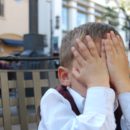Exposure Therapy’s Most Common Mistake: All Eggs in the Habituation Basket
Many people have an incomplete understanding of exposure therapy… …be it exposure and response prevention (ERP) for OCD, intentional mistake practice for social anxiety, or interoceptive exposures for panic disorder… This is true for exposure newbies, seasoned exposure veterans, and even some good CBT therapists. This limited understanding is based on the following flawed logic: Premise 1: Anxiety disorders involve fear. Premise 2: Fear is reduced through habituation. Premise 3: Habituation is accomplished via exposure. Conclusion: Habituation is the process by which individuals recover from anxiety disorders. Note: This conclusion is only partially correct. Exposure, when done right, is about much more than just habituation. It’s about learning to see the world in a new way and developing a different type of relationship with your symptoms. Exposure can help you challenge unhealthy, false beliefs about yourself and the world;...
Read MoreSensorimotor OCD & Social Anxiety Differential Diagnosis: “Obsessive Swallowing”
Reader Question: For the past year, I have been dealing with OCD-related sensorimotor obsessions focused on swallowing. My symptoms started during a class discussion in which I noticed myself swallow. Since then, whenever I am in a lecture or quiet place surrounded by people, I become deeply focused on my own swallowing and worry that others will notice my swallowing and then judge me. I am practicing meditation and daily exposures in which I sit down in a quiet room and intentionally invite the swallowing in. I also purposefully invite the swallowing in throughout the day, even when I am in the presence of friends. I try to be mindful of my swallowing without doing anything to avoid it or mask it. Even though my awareness of swallowing has not entirely gone away, the anxiety associated with it has...
Read MoreAgoraphobia – Symptom Attacks, Triggers, Panic, & Avoidance Behaviors
Let’s dispel a common misconception about agoraphobia. Agoraphobia is not a fear of the outdoors. Many people mistakenly believe this myth, due to the word’s Latin roots. Because agoraphobia can be broken down into the roots agora (“marketplace”) and phobia (“fear of”), many people assume that agoraphobia is a “fear of the marketplace” or a fear of being in wide open spaces. What is agoraphobia? However, this literal interpretation is different than what psychologists mean when they use the term agoraphobia. Clinical psychologists, therapists, and psychiatrists conceptualize agoraphobia as a fear of experiencing physical symptom attacks in certain types of situations (Zuercher-White & Pollard, 2003). Symptom attacks include full-blown panic attacks, limited symptom panic attacks (sweating, dizziness, disorientation, difficulty breathing. heart pounding, nausea), diarrhea, other gastrointestinal (GI) issues, vomiting, headaches, and feelings of dissociation, depersonalization, or derealization. Agoraphobia-related Situations The...
Read MoreFear, Doubt, Uncertainty, ERP, & the Monster Under the Bed
Everyone I know has, at some point, had to deal with the monster under the bed. Some do it with grace. Others falter. I’ve always been clumsy. I can vividly recall many terrified nights from my childhood, when I would lie rigidly in my bed, utterly paralyzed by fear. Afraid to make the slightest movement, to breathe, to call out for my parents…lest I be detected by IT. The pounding of my heart would be so loud in my ears, and my breathing so ragged, that I could swear the entire house could hear me. And yet…no one came to help. The moment would stretch out like taffy. At some point, my raw fear would ever so subtly decline, freeing me up to end the stalemate in one of several ways. Some nights, I would call out for help....
Read MoreSocial Anxiety Treatment: CBT & Intentional Mistake Practice (an example)
When I was a kid, one form of mischief that was briefly popular in my neighborhood was crank calling strangers. Usually, the bravest kid in the group would pick up the phone, and with the encouragement of all the other kids in the room, would dial a random telephone number. A brief, very Bart Simpson-esque conversation would then ensue. Usually it would go something like this: Kid: Hello, ma’am. I am conducting a brief survey for the Grocer’s Association. Do you have a minute to answer a quick question? Stranger: Of course. How can I help you? Kid: I was wondering if you have Sara Lee in the freezer. Stranger: Why, yes I do. Kid: Well then let her out!!! We would then bust out in laughter and hang up the phone, leaving the recipient of our phone call...
Read More







